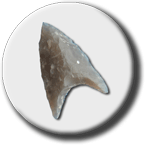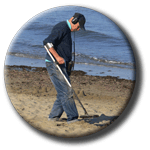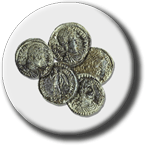Naturenet: Treasure
Treasure
P
 eople
have been living in the UK for several hundred thousand years and have cultivated
land here for more than five thousand years. An enormous quantity of tools
and other artefacts must have been discarded or lost during this period and
it is thus hardly surprising that large quantities can still be found within
the soil both in the countryside and within built-up areas.
eople
have been living in the UK for several hundred thousand years and have cultivated
land here for more than five thousand years. An enormous quantity of tools
and other artefacts must have been discarded or lost during this period and
it is thus hardly surprising that large quantities can still be found within
the soil both in the countryside and within built-up areas.
Study of this material,
which includes worked flint tools, pottery, coins and ornamental metal work,
tells us how people lived and who was doing what when and where. It is a valuable
educational resource which can lead us to a better understanding of our past.
Such material is frequently observed in the ground by farmers, builders or
gardeners during their work. If more than two or three items are found together,
this might indicate a "site" and
it is better that the archaeologists should be called out to examine the
place before the objects are removed from the ground. Items found can of
course be valuable, and there are laws concerning the discovery of such items,
which can sometimes be defined as 'treasure'.
 The increased popularity of metal detectors in recent
years has resulted in large quantities of ancient coin and metal work being
found and reported. This in turn has led to a much better understanding of
the history of sites where these finds are made. Although such finds very rarely
fall within the definition of "treasure", archaeologists are anxious
to examine and record all such finds. If you find something with a metal detector,
you should take it to a local archaeologist for identification. In some cases
it may be necessary for items to be sent to a national museum or a specialist
for formal identification, but this does not normally take more than a few
weeks and the depositor will be issued with a receipt. Finds are normally
handled in confidence and are not revealed to other detectorists.
The increased popularity of metal detectors in recent
years has resulted in large quantities of ancient coin and metal work being
found and reported. This in turn has led to a much better understanding of
the history of sites where these finds are made. Although such finds very rarely
fall within the definition of "treasure", archaeologists are anxious
to examine and record all such finds. If you find something with a metal detector,
you should take it to a local archaeologist for identification. In some cases
it may be necessary for items to be sent to a national museum or a specialist
for formal identification, but this does not normally take more than a few
weeks and the depositor will be issued with a receipt. Finds are normally
handled in confidence and are not revealed to other detectorists.
Note: The legal information on this page only refers to the
situation in England, Wales and Northern Ireland - the system in Scotland is
significantly different, and an explanation can be found from Highland
Council Archaeology Service.
The Treasure Act
1996 abolished the previous law of Treasure Trove. Finders
must report all finds of treasure to the coroner within 14 days after the
day on which they realised that the find might be treasure (for example,
as a result of having it identified). The obligation to report such finds
applies to everyone, including archaeologists. It is a criminal offence not
to report a find of treasure. In many counties this duty is delegated by
the Coroner to the County Archaeologist, Museums Service or equivalent for
all purposes concerned with the Treasure Act 1996. Any find which it is thought
might be classed as treasure should be reported immediately to the Coroner
or, if appropriate, County Archaeologist. These can usually be found in the
phone book, or any local museum which includes archaeological exhibits will
usually be able to advise.
The operation of the Treasure Act is explained in detail in The Treasure Act
1996; Code of Practice (Department of National Heritage 1997), summarised below.
The following finds are treasure under the Act:
- Objects other than coins: any object other than a coin provided that it
contains at least 10 per cent of gold or silver and is at least 300 years
old when found.
- Coins:
 all coins from the same find provided that there are at least two
and they are at least 300 years old when found (but if the coins contain
less than 10 per cent of gold or silver there must be at least 10 of them).
An object or coin is part of the same find as another object or coin if it
is found in the same place as, or had previously been left together with,
the other object. Finds may have become scattered since they were originally
deposited in the ground.
all coins from the same find provided that there are at least two
and they are at least 300 years old when found (but if the coins contain
less than 10 per cent of gold or silver there must be at least 10 of them).
An object or coin is part of the same find as another object or coin if it
is found in the same place as, or had previously been left together with,
the other object. Finds may have become scattered since they were originally
deposited in the ground.
Only the following groups of coins of coins will normally be regarded as coming
form the `same find':
- Hoards that have been deliberately hidden;
- Smaller groups of coins, such as the contents of purses, that may have
been dropped or lost, and
- Votive or ritual deposits.
Single coins found on their own are not treasure regardless of material, and
groups of coins lost one by one over a period of time (for example those found
on settlement sites or on fair sites) will not normally be treasure.
- Associated objects: any object, whatever it is made of, that is found in
the same place as, or had previously been together with, another object that
is treasure.
- Objects that would have been treasure
trove: any object that would previously
have been treasure trove, but does not fall within the specific categories
given above. These objects have to be made substantially of gold or silver;
they have to have been buried with the intention of recovery and their owner
or his heirs cannot be traced.
The following types of find are not treasure:
- Objects whose owners can be traced.
- Unworked natural objects, including human and animal remains, even if they
are found in association with treasure.
- Objects from the foreshore if there is evidence that they have come from
a wreck.
If there is any doubt, it will be safest to report the find.
The British Museum will be informed of finds which may be treasure and will
be asked whether it or other museums would be interested in acquiring all or
part of the finds. If no museum wishes to acquire a find which is believed
to be treasure, then the find will normally be returned to the finder.
If a museum does wish to acquire part or all of a find, then the coroner will
hold an inquest to decide whether it is treasure. If the find is declared to
be treasure, ownership becomes vested in the Crown. The treasure will then
be taken to the British Museum where it will be valued by the Treasure Valuation
Committee, which consists of independent experts. The Committee will commission
a valuation from experts drawn from the trade and will also consider valuations
provided by the finder or by any other interested party.
When the valuation has been agreed, the museum can acquire the treasure and
the Secretary of State will pay a reward based upon the valuation ands the
following considerations:
- Where the finder has permission to be on land, rewards will be paid in
full to him or her. If the finder has made an agreement with the occupier/landowner
to share any reward, the Secretary of State will normally follow it.
- If the finder does not remove the whole of a find from the ground but allows
archaeologists to excavate the remainder of the find, the original finder
will normally be eligible for a reward for the whole find.
- Rewards will not normally be payable when the find is made by an archaeologist.
- Where the finder has committed an offence in relation to a find, or has
not followed best practice as set out in the Code of Practice, he or she
may expect no reward at all or a reduced reward. Landowners and occupiers
will be eligible for rewards in such cases.
This page is based on text written by David Motkin, formerly of the Isle
of Wight Council's Archaeology and Historic Environment Service; reproduced with
kind permission.
Council for British Archaeology
Portable Antiquities Recording Scheme: this scheme has been set up to promote
and co-ordinate the recording of archaeological finds in England and Wales.
Government
page on treasure.

 eople
have been living in the UK for several hundred thousand years and have cultivated
land here for more than five thousand years. An enormous quantity of tools
and other artefacts must have been discarded or lost during this period and
it is thus hardly surprising that large quantities can still be found within
the soil both in the countryside and within built-up areas.
eople
have been living in the UK for several hundred thousand years and have cultivated
land here for more than five thousand years. An enormous quantity of tools
and other artefacts must have been discarded or lost during this period and
it is thus hardly surprising that large quantities can still be found within
the soil both in the countryside and within built-up areas. The increased popularity of metal detectors in recent
years has resulted in large quantities of ancient coin and metal work being
found and reported. This in turn has led to a much better understanding of
the history of sites where these finds are made. Although such finds very rarely
fall within the definition of "treasure", archaeologists are anxious
to examine and record all such finds. If you find something with a metal detector,
you should take it to a local archaeologist for identification. In some cases
it may be necessary for items to be sent to a national museum or a specialist
for formal identification, but this does not normally take more than a few
weeks and the depositor will be issued with a receipt. Finds are normally
handled in confidence and are not revealed to other detectorists.
The increased popularity of metal detectors in recent
years has resulted in large quantities of ancient coin and metal work being
found and reported. This in turn has led to a much better understanding of
the history of sites where these finds are made. Although such finds very rarely
fall within the definition of "treasure", archaeologists are anxious
to examine and record all such finds. If you find something with a metal detector,
you should take it to a local archaeologist for identification. In some cases
it may be necessary for items to be sent to a national museum or a specialist
for formal identification, but this does not normally take more than a few
weeks and the depositor will be issued with a receipt. Finds are normally
handled in confidence and are not revealed to other detectorists. all coins from the same find provided that there are at least two
and they are at least 300 years old when found (but if the coins contain
less than 10 per cent of gold or silver there must be at least 10 of them).
An object or coin is part of the same find as another object or coin if it
is found in the same place as, or had previously been left together with,
the other object. Finds may have become scattered since they were originally
deposited in the ground.
all coins from the same find provided that there are at least two
and they are at least 300 years old when found (but if the coins contain
less than 10 per cent of gold or silver there must be at least 10 of them).
An object or coin is part of the same find as another object or coin if it
is found in the same place as, or had previously been left together with,
the other object. Finds may have become scattered since they were originally
deposited in the ground.